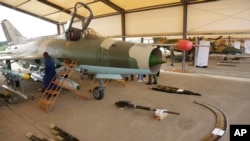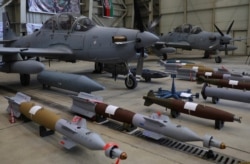A new agreement between Nigeria and Russia provides “a legal framework” for Moscow to supply military equipment and training to the West African nation as it struggles with Islamist militant extremists and other security challenges.
The Nigerian Embassy in Moscow released a statement calling the agreement, signed Monday, “a landmark development in bilateral relations.” It provides a framework “for the supply of military equipment, provision of after sales services, training of personnel in respective educational establishments and technology transfer, among others.”
It furthers “our bilateral cooperation with the Russian Federation in this area,” Abdullahi Shehu, Nigeria’s envoy to Russia, told VOA’s Hausa Service by phone Thursday from Moscow.
Nigeria already uses some Russian fighter jets and helicopters, alongside military equipment purchased from Western powers, such as the United States, according to Reuters news service.
Shehu said the new five-year pact did not preclude more collaboration with “other strategic partners.”
Reuters reported in late July that U.S. lawmakers had put a hold on a proposal to sell almost $1 billion worth of weapons to Nigeria over concerns about possible human rights abuses by the government. Reuters elaborated in reporting this week that, according to several sources last month, “the proposed sale of 12 attack helicopters and related equipment was being delayed in the Senate Foreign Relations Committee and the House Foreign Affairs Committee.”
Shehu, asked whether the agreement reached with Russia was influenced by the failure to secure a deal with the U.S. government, told VOA, “No, no, no, no … After the signing ceremony, I said clearly that Nigeria is not looking for alternatives but complementarity and mutual benefits. So, the fact that Nigeria has signed agreement with Russia does not affect Nigeria's relationship and cooperation with its strategic partners around the world.”
A U.S. State Department spokesperson gave VOA a statement: "Nigeria is a critical partner in the fight against terrorism in Africa. … Our security cooperation with Nigeria aims to enable the Nigerian government to better protect its citizens and defeat terrorist groups that threaten U.S. interests, while respecting human rights and the law of armed conflict.”
Nigeria is confronting several security challenges: the Islamist extremist groups Boko Haram and ISIS West Africa Province (ISWAP), a wave of kidnappings and a resurgent separatist movement for an independent state of Biafra in the country’s southeast.
The State Department spokesperson said U.S. military assistance included military education and training, as well as training and equipping “law enforcement and judiciary professionals” in an array of priorities, such as from “stopping banditry to protecting intellectual property rights to more effectively addressing trafficking in persons and gender-based violence.”
The State Department, in a fact sheet on U.S.-Nigeria security cooperation released in March, says the two countries “have enjoyed a strong security partnership and friendship” for over 50 years. It cited Nigeria’s importance as Africa’s most populous country, biggest economy and top oil producer.
The fact sheet outlined U.S. spending to strengthen security in the country – for example, $7.1 million for Nigerian military training from fiscal years 2016 through 2020. It also noted $590 million in “active government to government” military sales cases.
Those cases include the controversial sale of a dozen A-29 Super Tucano attack planes worth more than $494 million. Six of the aircraft were delivered to Nigeria in July and the rest are expected in September.
Their sale initially was announced in 2016 but later stalled by the Obama administration over concerns about the Nigerian military’s rights abuses – including the January 2017 bombing of a displaced persons camp in northeastern Borno state. The military said the bombing, which left at least 112 civilians dead, was accidental, based on wrong target coordinates.
The Trump administration later approved the deal, saying the planes would aid Nigeria’s fight against insurgents and bolster defense jobs in the United States. The propeller-driven plane is made by Brazil’s Embraer, which has a second production line in Florida.
The Super Tucano aircraft are intended to aid Nigeria’s military in combating Islamist militant extremists and countering trafficking.
Grace Alheri Abdu of VOA Hausa service and Nike Ching at the State Department contributed to this report.

